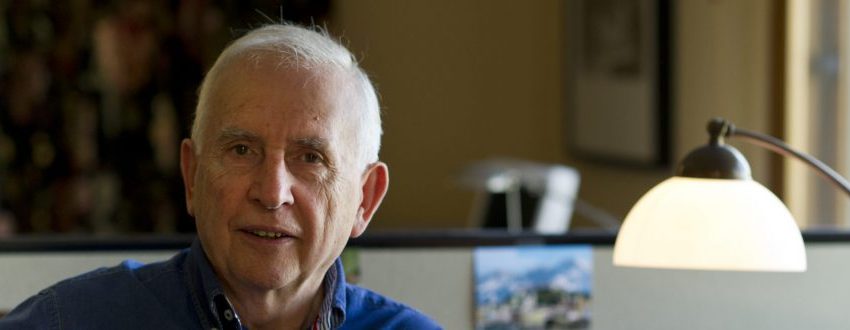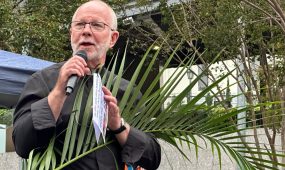The state of the nation starts in your street
Reflections
The health of a society can best be gauged by the health of its local neighbourhoods, since that’s where we must learn to get along with people we didn’t choose to live amongst, writes Hugh Mackay

As wake-up calls go, you couldn’t really ask for anything louder than this. Two facts about contemporary Australia seem to me to be so significant, they constitute the clearest possible warning about the direction our society is taking.
Fact #1: We are experiencing a mental health crisis and, in particular an epidemic of anxiety, with two million sufferers from an anxiety disorder last year alone. Add to that the rates of depression and other forms of mental illness, and we start to look like a very sick society.
Imagine how concerned we would be if a more visible disease was occurring on such a scale. Because the symptoms are silent and invisible – sufferers are not coughing, limping or bleeding – we are generally unaware of the extent of mental illness.
There are many specific triggers for anxiety in individual cases, of course. Relationship breakdown, job insecurity, rent stress, loss of faith, addiction to an IT device (strongly correlated with high rates of anxiety), lack of sufficient “nature contact” time… even a concern with the future of the planet itself.
But when anxiety and depression are occurring on such a large scale, we need to look beyond individual, personal triggers to some more basic, societal factors that might be driving such a widespread epidemic.
Here’s where fact #2 comes in: We are a more fragmented society than we have ever been in our history. Consider the impact of such social changes as these:
The single person household is our fastest-growing household type, already accounting for one household in four, and projected to rise to one in three within the next decade. Not everyone who lives alone feels lonely, of course: many solo householders revel in their sense of freedom and independence, but when every third or fourth household contains only one person, the risk of social isolation is greatly increased. (The UK government has acknowledged the problem by appointing a minister for loneliness.)
Advertisement
Our rate of divorce and other forms of relationship breakdown remains stubbornly high, with the fallout affecting families and friends as well as the couples themselves. Roughly one million dependent children now live with only one of their natural parents, with regular, and often disruptive, access visits to the non-custodial parent.
Our birthrate is at an historically low level, which means the valuable role of kids as a kind of social lubricant in the local neighbourhood has diminished.
We are more mobile than ever, moving house, on average once every six years. Thanks to almost universal car ownership – that other form of mobility – we are spending more time than ever in those little bubbles of social isolation.
We are busier than ever – so busy that we now greet each other with How y’going – busy? as though not to be busy would be disgraceful. (When did busyness become a virtue, rather than a sign of inefficiency and wrong priorities?) The busier we are, the less time and energy we have for nurturing the relationships that create healthy neighbourhoods and communities.
We are caught in the grip of the IT revolution – that paradoxical phenomenon that promises greater connectedness than ever, yet makes it easier than ever for us to stay apart. (No wonder the heaviest users of social media are also the most likely to report a heightened sense of loneliness.)
Advertisement
More could be added to that list – such as the effects of increasing income inequality, and a housing stock that is no longer appropriate for the way we live – but you get the idea: there’s an accumulation of societal factors putting pressure on the stability and cohesiveness of local neighbourhoods. In my view, the health of a society can best be gauged by the health of its local neighbourhoods, since that’s where we must learn to get along with people we didn’t choose to live amongst.
Take another look at those two facts: increased anxiety and increased social fragmentation. They are really two sides of the same coin, inextricably linked: fragment a society and watch the level of anxiety rise.
We are, after all, social beings who need strong personal connections with each other. We need communities to belong to, to nurture, support and protect us, and even to give us a sense of our own personal identity (since personal identity is meaningless without a social context).
It’s no surprise that solitary confinement is regarded as the harshest punishment we can inflict on prisoners in our criminal justice system. For a herd animal to be cut off from the herd is brutal punishment indeed.
That’s why a growing number of psychologists and medical practitioners around the world are identifying social isolation as a major threat to public health (one recently claiming it poses a greater threat to public health than obesity does).
So what’s to be done? This is our epidemic, after all. We ourselves have been creating the changes to our way of life that have increased the risk of social isolation, so we need to own the consequences as well and do something to reduce their impact.
The best starting point for tackling the problem involves taking a deep breath and making a perfectly rational assessment of the implication of that deepest of all truths about us – that we really are social beings who need to belong to healthy, mutually-supportive communities. From there it’s a short step to the essence of the Sermon on the Mount: we are at our best when we learn to treat each other with kindness and respect, based not on our affection for each other, but on the simple recognition of our common humanity.
Compassion is the great antidote to personal anxiety, because it shifts the focus from our own concerns to the needs of others, and nothing steadies the emotions like the knowledge that someone else needs me.
But compassion is also like the high-octane fuel that drives the machinery of social cohesion – it’s the crucial ingredient in any well-functioning community, and faith communities are potentially the finest exemplars of that.
The commitment to compassion as a way of life transforms individuals, families, neighbourhoods and communities. And it’s the simplest thing in the world to take the first step: always smile and say hello when you pass someone in the street or sit beside them on a bus. That might be just the moment when a friendly nod or smile was all they needed to be assured that they, too, belong here; that they are being taken seriously at least to the extent of being acknowledged.
Reach out. Connect. Make sure you know your neighbours. Be alert to the possibility of people in your own street who might be vulnerable to social isolation. Join a choir, a book club, a local sporting team, a faith community; support a local charity… anything that links you to the neighbourhood you live in.
If enough of us believed that the state of the nation starts in our street – that the values and ethos of a society really does start with us – the transformation would soon begin.
This article was first published in the July 2018 edition of The Good Oil, the e-magazine of the Good Samaritan Sisters.





